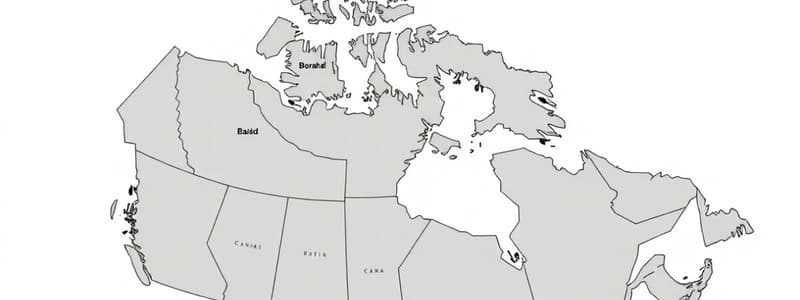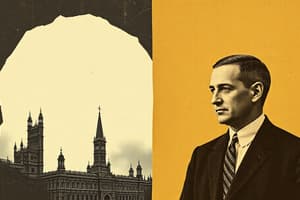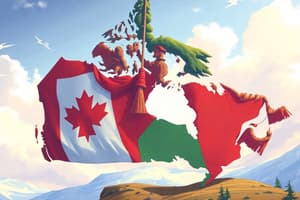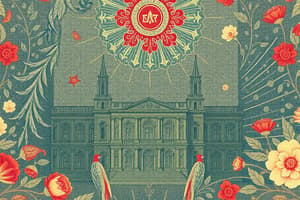Podcast
Questions and Answers
What is the primary function of the Governor General in Canada's federal system?
What is the primary function of the Governor General in Canada's federal system?
- To summon, prorogue, and dissolve Parliament. (correct)
- To lead the political party with the second most seats.
- To control the governing party and set policies.
- To implement government policies and programs.
In a provincial government, who primarily selects ministers to form the Executive Council?
In a provincial government, who primarily selects ministers to form the Executive Council?
- The Speaker of the House
- The Lieutenant Governor
- The Leader of the Opposition
- The Premier (correct)
Which of the following best describes the roles of the 'backbenchers' within the Canadian federal government?
Which of the following best describes the roles of the 'backbenchers' within the Canadian federal government?
- They vote, participate in debates, and raise issues. (correct)
- They are responsible for managing the public service.
- They set the federal government's policies and priorities.
- They lead a political party within the House of Commons.
Which branch of the Canadian government is responsible for creating laws?
Which branch of the Canadian government is responsible for creating laws?
What is the primary role of Members of Provincial Parliament (MPPs) in the government?
What is the primary role of Members of Provincial Parliament (MPPs) in the government?
In a Canadian context, what does a 'minority government' indicate?
In a Canadian context, what does a 'minority government' indicate?
What does the term 'seats' refer to in the context of a provincial or territorial legislature?
What does the term 'seats' refer to in the context of a provincial or territorial legislature?
What is the main purpose of the 'Official Opposition' in the Canadian House of Commons?
What is the main purpose of the 'Official Opposition' in the Canadian House of Commons?
Which level of government is primarily responsible for running cities, towns, and districts?
Which level of government is primarily responsible for running cities, towns, and districts?
What is the main function of a municipal council?
What is the main function of a municipal council?
What is the role of the Lieutenant Governor within a Canadian province?
What is the role of the Lieutenant Governor within a Canadian province?
What is the main difference in responsibilities between the federal and provincial governments in Canada?
What is the main difference in responsibilities between the federal and provincial governments in Canada?
What is meant by the term 'caucus' in the context of Canadian politics?
What is meant by the term 'caucus' in the context of Canadian politics?
Which of the following best describes the role of the Speaker of the House?
Which of the following best describes the role of the Speaker of the House?
Which of these scenarios best illustrates the principle of federalism as practiced in Canada?
Which of these scenarios best illustrates the principle of federalism as practiced in Canada?
What is the difference between a 'bill' and an 'Act'?
What is the difference between a 'bill' and an 'Act'?
Which level of government is primarily responsible for the maintenance of local playgrounds in Canada?
Which level of government is primarily responsible for the maintenance of local playgrounds in Canada?
In the Canadian federal system, which of the following is primarily a provincial responsibility?
In the Canadian federal system, which of the following is primarily a provincial responsibility?
Which of the following is a shared responsibility between provinces and the federal government?
Which of the following is a shared responsibility between provinces and the federal government?
A dispute between two private citizens over a property line would fall under which area of law?
A dispute between two private citizens over a property line would fall under which area of law?
What is the main purpose of transfer payments within the Canadian federal budget?
What is the main purpose of transfer payments within the Canadian federal budget?
Which of the following best describes the role of the Federal government?
Which of the following best describes the role of the Federal government?
Which concept is best represented by the ability of voters to directly decide on specific issues, rather than relying solely on elected representatives?
Which concept is best represented by the ability of voters to directly decide on specific issues, rather than relying solely on elected representatives?
What is a key difference between a party platform and a government policy?
What is a key difference between a party platform and a government policy?
A political party that promotes minimal government intervention in the economy is most aligned with which of the following?
A political party that promotes minimal government intervention in the economy is most aligned with which of the following?
The primary goal of Canada's Youth Criminal Justice Act is to:
The primary goal of Canada's Youth Criminal Justice Act is to:
What is the role of 'Innocence Canada' in the Canadian legal system?
What is the role of 'Innocence Canada' in the Canadian legal system?
Which tax is predominately calculated on an individual's earning income?
Which tax is predominately calculated on an individual's earning income?
Which of the following is NOT a typical influence on the creation of government policy?
Which of the following is NOT a typical influence on the creation of government policy?
According to the content provided, which federal political party prioritizes focusing on climate change and growing clean energy?
According to the content provided, which federal political party prioritizes focusing on climate change and growing clean energy?
Which of these represents a type of policy that would likely be influenced by a country's relationships with other countries?
Which of these represents a type of policy that would likely be influenced by a country's relationships with other countries?
Flashcards
Federalism
Federalism
A system where power is divided between a central (federal) government and regional (state/provincial) governments.
Legislative Branch
Legislative Branch
The branch of government responsible for making and passing laws. In Canada, this is Parliament.
Executive Branch
Executive Branch
The branch of government responsible for carrying out and enforcing laws. In Canada, this is the Crown represented by the Governor General and the Prime Minister and Cabinet.
Judicial Branch
Judicial Branch
Signup and view all the flashcards
Federal Government
Federal Government
Signup and view all the flashcards
Provincial Government
Provincial Government
Signup and view all the flashcards
Minority Government
Minority Government
Signup and view all the flashcards
Caucus
Caucus
Signup and view all the flashcards
Leader of a Party
Leader of a Party
Signup and view all the flashcards
Political Party
Political Party
Signup and view all the flashcards
Mayor
Mayor
Signup and view all the flashcards
Bill
Bill
Signup and view all the flashcards
Act
Act
Signup and view all the flashcards
Civil Law
Civil Law
Signup and view all the flashcards
Political Ideology
Political Ideology
Signup and view all the flashcards
Conservatism
Conservatism
Signup and view all the flashcards
Liberalism
Liberalism
Signup and view all the flashcards
Socialism
Socialism
Signup and view all the flashcards
Communism
Communism
Signup and view all the flashcards
Fascism
Fascism
Signup and view all the flashcards
Liberal Party
Liberal Party
Signup and view all the flashcards
Conservative Party
Conservative Party
Signup and view all the flashcards
New Democratic Party
New Democratic Party
Signup and view all the flashcards
Bloc Quebecois
Bloc Quebecois
Signup and view all the flashcards
Green Party
Green Party
Signup and view all the flashcards
First Past the Post
First Past the Post
Signup and view all the flashcards
Proportional Representation
Proportional Representation
Signup and view all the flashcards
Referendum
Referendum
Signup and view all the flashcards
Study Notes
Canada's Federal System of Government
- Canada's government power is divided between federal and provincial/territorial levels.
- Federal (central) government has jurisdiction over the whole country.
- Federal system balances responsibilities & power.
- Federalism accommodates diversity in large, diverse countries like Canada.
Canadian Branches of Government
- Executive: Held by the Crown, carried out by the Governor General and Prime Minister/Cabinet.
- Legislative: Parliament is the legislative branch of the federal government.
- Judicial: The Supreme Court of Canada
Federal Government
- Governor General: Summons, prorogues, and dissolves Parliament.
- Prime Minister: Leads the governing party and acts as their spokesperson.
- Cabinet: Advisors setting federal policies and priorities.
- Backbenchers: Parliament members without significant roles, but still participate in debates and raise issues.
- MPs (Members of Parliament): Elected representatives who create, debate, and vote on federal laws and issues. The Prime Minister leads the MPs.
- Public Service: Implements government policies, programs, and services.
- House of Commons: Where MPs debate/pass laws, examine the government, and represent their constituents.
- Parties: Organized groups of individuals with shared beliefs, values, and goals.
- Leaders: Lead political parties.
- Caucus: All elected party members in the House of Commons.
- Official Opposition: Party with the second most seats in the House.
- Minority Government: When a party wins the most seats but less than half the total.
Provincial Government
- Responsible for issues within their province/territory, such as education, health care, social welfare, and infrastructure.
- Lieutenant Governor acts in a ceremonial role, symbolizing provincial sovereignty.
- Premier leads the provincial cabinet.
- MPPs (Members of Provincial Parliament) enact/amend/repeal laws and regulations.
- MPPs participate in policy development and represent their government.
Municipal Government
- Run cities, towns, and districts.
- Mayor & Council responsible for municipal finances & services.
Majority vs. Minority Government
- A minority government occurs when no single party has more than 164 MPs elected.
- A majority government occurs when a party holds more than half the seats (164+).
Speaker of the House
- An MP selected to act as a neutral referee, enforcing rules.
- Must be non-partisan.
Question Period
- Occurs daily in Parliament, allowing opposition to question MPs and cabinet members for 45 minutes.
The Senate
- The Senate can block bills passed by the House of Commons.
How Laws are Made: Bill vs. Act
- Bill: Proposed legislation.
- Act: Bill that has become law.
- Government Bills: Introduced by the ruling party.
- Private Member's Bills: Introduced by individual MPs without government support (less likely to pass).
Canada's Justice System
- Goals: safety, social order, respectful fundamental rights
- Fundamental Rights : right to know cause of arrest), right to lawyer, innocent until proven guilty
- Criminal justice Process: investigation, arrest, initial appearance, pre-trial, trial, sentencing, and potential appeal
- Youth Criminal Justice Act: Emphasizes rehabilitation and early intervention
- Wrongful Convictions: mechanisms (appeals, federal reviews like Innocence Canada) to correct.
- Civil Law: Deals with disputes between individuals or organizations, aiming to resolve private conflicts.
Political Ideologies
- Political ideologies represent sets of principles explaining how society should function, offering a blueprint for political and cultural order.
- Examples include Communism, Socialism, Liberalism, Conservatism, and Fascism.
Canada's Political Parties
- Table showing party leaders, ideologies, stances on taxation, economics, social programs, crime, healthcare, environment, military.
Elections
- Elections occur every 5 years.
- One person (MP) is elected for each riding.
- First past the post system for electing MPs.
- Steps in the election process: call, nominations, voters lists, campaigns, election day, vote counting.
- The winner is the candidate with the most votes.
- Different voting systems and options (proportional representation) exist.
Studying That Suits You
Use AI to generate personalized quizzes and flashcards to suit your learning preferences.




